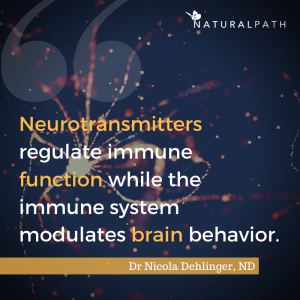It is important to recognize our bodies as a complex system of systems, each influencing the other in a dynamic orchestration which cannot be described as anything but divine. When we’re aware of how systems interplay with each other, we can feel empowered to make choices that create a more robust overall system, realizing that this confers improved immunity, a relaxed nervous system, and optimized digestion. In a word, better health.
An innate immune response is pivotal in maintaining the delicate balance between health and disease

There is an especially dynamic interplay between the immune and nervous systems. A successful innate immune response is pivotal in maintaining the delicate balance between health and disease; an insufficient response results in infection, whereas an excessive response results in prolonged inflammation and tissue damage. Alterations in the state and function of the nervous system influence the immune response. The nervous system regulates innate immune responses through the release of neurotransmitters, neuropeptides and neurohormones.
Extensive communication with nerves from sympathetic and parasympathetic tissue and organs
The immune system and the nervous system maintain extensive communication with nerves from both the sympathetic (fight, flight or freeze) and the parasympathetic (rest, digest and heal) nervous systems to lymph (immune) tissue and organs all over the body. Neurotransmitters regulate immune function while the immune system modulates brain behavior. The same molecules that modulate the T cells of the immune system also facilitate development of neuronal connections.
From fever to stress
From fever to stress, the influence of one system on the other has intricately evolved to help sense danger and to mount an appropriate adaptive response. Over recent decades, reasonable evidence has emerged that these brain-to-immune interactions are highly modulated by psychological factors which influence immunity and immune system-mediated disease.
One choice that we make multiple times a day – what we eat – has a very significant impact on every system in the body. Understanding how nutrition can influence your system can be a positive motivator to make “healthier” choices because now you understand the “why.”
When faced with fear and anxiety, here’s what you can do

When we are faced with fear and anxiety, we may often feel powerless to DO anything about it. This couldn’t be farther from the truth. What you eat has been scientifically proven to improve your body’s response to stress, which positively impacts immunity.
What to focus on:
- Omega-3’s: proven to lower overall cortisol levels and balance inflammation.
- Omega-3’s and Turmeric: elevate brain-derived neurotrophic factor (BDNF) which helps increase brain plasticity, helps the synapses to fire more effectively, protects neurons – helps repair and maintain neural circuits important for learning and memory.
- Vitamin C: reduces physical reactivity to stress and lowers basal cortisol over time. An important co-factor in stress response.
- Magnesium: decreases excess levels of cortisol and adaptation to physical stress. In people struggling with insomnia, research has shown it can decrease overall cortisol burden and improve sleep.
- B vitamins: helps with adaptation to stress. Co-factors in the entire stress response and neurotransmitter production, B vitamins enhance nerve cell communication and protect nerves. They are involved in production of energy, synthesis of steroid hormones (like cortisol) and normal function of adrenal gland.
- Trace minerals: important co-factors in the nervous system and essential to production of neurotransmitters, especially copper.
- Reservatrol: found in red wine, berries, and grapes, highly protective not just of brain, but heart and kidney too. Assists mitochondrial function (the literal powerhouse of your cells) by improving neuron function and reducing oxidative stress.
A well-balanced approach is the key to optimal health for all of your systems
Just as dietary experts now emphasize eating patterns over single nutrients, it’s not that one diet works better for the nervous system and others for the rest of the body. But rather, a well-balanced approach – including not overeating – is the key to optimal health for all of your systems.

Dr Nicola Dehlinger, ND, graduated from SCNM in 2004. Dr Nicola sees clients from around the world in her naturopathic medical practice, Pura Vida Natural Healthcare, in Durango, CO. She is an expert in the treatment of anxiety, depression, and insomnia. She is able to minimize supplements and medications as her patients become empowered to heal themselves. In addition to seeing clients, Dr Nicola leads group and private retreats. She also teaches a variety of online and in-person classes. In her free time, you can find Dr Nicola in the mountains or the kitchen, enjoying time with her husband, son, and their dogs. Website: www.puravidahealthcare.com

















